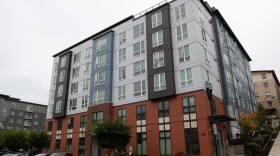In 2019, the City of Tacoma adopted a strategy to increase the amount of housing available without changing the city’s zoning or adding any notable density increases. More than five years later, the city says the policy has helped create nearly 600 homes.
According to a housing report drafted by city officials, in 2017, the city was projected to need more than 59,000 new units of housing by 2050 to meet population growth estimates. With much of Tacoma’s land developed to capacity, the city adopted a strategy to incentivize home owners to build additional units on their property.
In 2019, the City Council passed an ordinance intended to remove barriers and streamline the permitting process for building accessory dwelling units (ADUs) — detached structures that could be built in a backyard and rented out to a tenant or shared with a family member.
The ordinance eases the regulations on ADUs and allows them to be built in any residential area in the city. It also eliminates occupancy limits previously imposed by the city.
Nearly two-thirds of Tacoma was zoned as single-family residential in 2024, according to a housing report from the city.
Recently, the city has made efforts to diversify the types of housing available to residents. Zoning changes passed by the city council in 2024 took effect in February, encouraging the development of multi-family dwellings, townhomes, houseplexes, courtyard housing, multiplexes, and ADUs.
Maria Lee, a spokesperson for the City of Tacoma, told The News Tribune ADUs can create “gentle density” for neighborhoods as it increases housing stock in a way that is less noticeable than building multi-family housing buildings.
She said they also provide flexibility for families who can use them to affordably house aging members of the family.
The city’s current ADU-building guidelines require the structure to have facilities for cooking and sanitation, as well as access to the nearest sidewalk, making them fully ready to lease to a tenant.
According to data from the city, since the policies were changed, 581 ADUs have been permitted through July 2, 2025.
“The impact of these policy changes was immediate and profound,” Lee told The News Tribune. “Prior to this, ADUs were relatively rare in Tacoma.”
According to city data, the city permitted an average of less than seven ADUs per year before 2019, after the changes the city saw an average of nearly 10 per month.
Lee said since the success of the 2019 ordinance, the city has continued to improve its ADU-permitting program. In March of this year, the city started an ADU accelerator program which provides pre-approved ADU designs for land owners to choose from.
In recent years, much of the new housing developed in Tacoma has been multifamily complexes. According to a 2025 Tacoma housing report, roughly 930 single-family homes were permitted from 2017 to 2023. During the same time more than 4,800 multifamily units were permitted.
Most of those units were permitted in specific parts of town. A map of permitted homes from 2017 to 2023 shows the majority of multifamily units permitted in downtown and South Tacoma.
The authors of the 2025 housing report identified that ADUs are an “important component” to the community’s housing stock, allowing for increased housing affordability in neighborhoods that otherwise might be less accessible to renters.
“They offer flexibility for homeowners to live multi-generationally or with caregiving support, to supplement income by renting the additional unit, and to meet a variety of other personal and familial needs.” the report wrote. “ADUs that become rental units are often priced at affordable rates and may offer access to new neighborhoods that are predominantly occupied by homeowners.”
The push for ADUs is not unique to Tacoma. Several cities including Seattle, Lacey and Renton have all started their own ADU accelerator programs to encourage development.
In 2023, the state Legislature passed HB 1337, a bill limiting the requirements and restrictions cities can have on the development of ADUs in their community.
This article was first published by the Tacoma News Tribune through the Murrow News Fellow program, managed by Washington State University.





